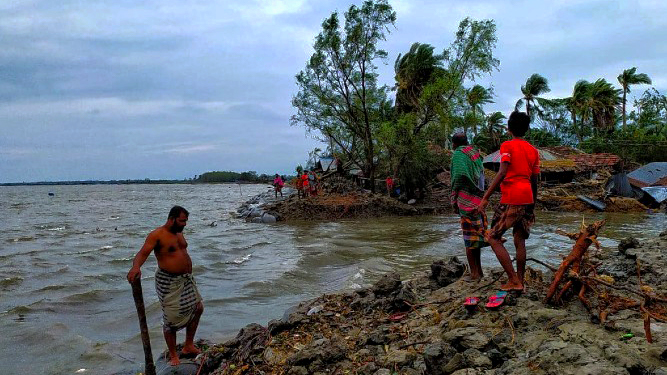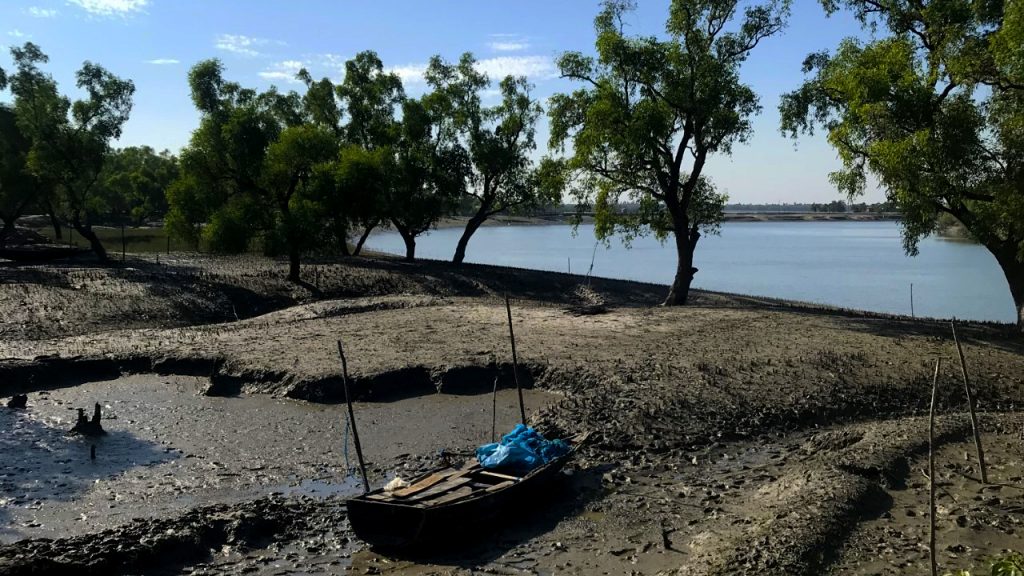With so many problems on their plate, Bangladesh is desperately in need of a long-term solution – but what solutions are available?

Whatever part of the country they are living in, for many Bangladeshis the writing is already on the wall. The area they live in, for one reason or another, may not be inhabitable in as few as one or two decades. Despite this, these people do not currently have any kinds of legal protections afforded to them by the international community, and this could lead to some serious consequences incredibly soon if it is not remedied.
First off, understanding what makes someone a refugee is very important. To be eligible for the legal protections granted to refugees, you need to meet a fairly specific classification. David Durand-Delacre, a PhD candidate from Cambridge University studying the relationship between climate change and migration, said: “A refugee is a very well-defined category in the law under the Geneva Convention. To become a refugee, you have to be persecuted for political reasons, or reasons related to your religious beliefs, your ethnic identity, [or] your sexual identity.”
This definition manages to encompass all forms of persecution to a high degree, but in the current era it is not nearly broad enough. It still does not include people forced to move due to climate change, and unfortunately according to David there is little prospect for the Geneva Convention to amend this. The reasons for this are complex and deeply political.
“With the Geneva convention there’s basically a consensus that an adaptation of the existing refugee protection regime is not going to happen. People are too scared that if you opened up the Geneva convention, because it’s already so hard to get states to apply to refugee protections and to guarantee refugee protections, as soon as you start renegotiating something there’s a potential it will start being weakened. They don’t want to open that can of worms in a sense.”
“It’s hard to prove that climate change is the one thing that’s causing people to move, so it’s very contested. When you say people are moving because of climate change, it might superficially seem quite obvious but when you go and you look at how people actually respond to the changing economic, social, climate conditions around them, the reasons why they move and how they move are actually quite hard to predict. This is true across the board of all migratory patterns but with climate change its difficult to prove with any sort of certainty.”
Adnan, a Bangladeshi who works for WaterAid in Dhaka, has to pay close attention to the ways other nations treat climate migrants. The fact that people who are forced to move because of the climate do not get the label or the legal protections of refugees is not something he supports. Working closely with the people directly affected by international decisions like this gives him a perspective many others will not have.
“It’s sad that the Boris Johnson government announced there is no such thing as climate refugees. That pissed me off in the sense that institutions working in the UK – Groundswell recently published a report saying that 19.9 million people will be displaced within Bangladesh by 2050. It contradicts everything we’re trying to do to help people out – there are people in power actively trying to state it doesn’t exist. It does anger me sometimes.”

What can be done?
Europe in general has been struggling with the treatment of migrants in recent years, especially in France and the UK. The Syrian refugee crisis specifically has sparked numerous conversations about the rights of refugees and migrants, and the Brexit referendum in the UK led to an increase in hate crimes against people perceived as foreign to the country.
“The French government and the European Union’s migrant policies are dedicated to keeping people out, and in that context opening up a new category of climate migrants is something that jars with that, it would be quite contradictory because it would open up a new point of entry in their view,” David said.
There are certainly efforts being made by academics and NGOs to help recognise people displaced by climate change as refugees, but it is unlikely that an international agreement will be reached anytime soon. While some of the struggles climate migrants will deal with are unique to them, it is important to understand that in many ways we have seen this exact crisis repeating over and over again throughout history. David believes that this means limiting campaigning to just the protections of climate migrants would be a wasted effort.
“I think if there is a change that needs to happen that would guarantee more protections, it’s protections for all migrants. That involves supporting all the work being done by lots of NGOs and academics who think we should be focusing on a more open Europe in general. That’s where the climate change and climate justice aspect of climate migration really has to meet the broader social justice agenda that’s at stake here.”
“One really important advance that would be much better than right now would be the right to work, giving asylum seekers the right to work would really facilitate their integration if they decide to stay but also cut a lot of the suffering from this sort of whole long process that people are forced through.”
Given the enormous threat the climate crisis poses to the world, it makes sense that the solutions necessary would be intersectional. There needs to be healthy co-operation between refugee advocacy groups and environmental NGOs in order to help push policy which will help all migrants as one cohesive group. This would make things easier for climate refugees, a group facing enough hardship as it is, but it would also improve the lives of other refugees significantly.
“The focus needs to be less on why people come – I think if you’re looking at people who are arriving in the shores of Europe, whether they’re climate migrants or not doesn’t really matter. This is the position lots of migrant help NGOs take at this stage, what we need is to ensure first that the right to asylum is still protected. When people turn up and request asylum they should be given the rights for their case to be heard and for the financial support while they wait, as well as housing and things like that while they wait.”
“There are changes to deportation laws that need to happen, there are changes to the way we handle incarceration of migrants, there’s a lot of concrete things European governments do nowadays that need to be challenged and changed.”
Decolonisation
Most Bangladeshis – like any citizen or refugee forced out of their country – don’t want to leave Bangladesh. They have a cultural and familial connection to the land, and often seeking refuge in a foreign country can be nearly as dangerous as staying. Not all displaced Bangladeshis will leave Bangladesh – a significant number will just move further inland. More than half of the people leaving coastal areas to more urban environments are moving wholly because of push factors which made staying impossible.
Generally, people displaced by climate change do not want to leave but realise that staying would mean endangering themselves in areas at risk of climate disaster, without sufficient infrastructure in place to protect them. While it might be difficult for many to stay, it’s important for policy decisions to include those most affected, and this is where decolonisation comes in.
As it stands, there is no humanitarian way to limit the intake of refugees into a country. The fewer refugees a country admits, the more people will drown in the Mediterranean, or suffer in slums kept away from large population centres. This is true regardless of a person’s reason for seeking asylum. European nations, especially nations like the UK and France who have refused to do their part in helping Syrian refugees, need to make a change to their treatment of refugees. It’s important to consider that Bangladesh’s carbon footprint is miniscule compared to the EU, but Bangladesh is the country struggling under climate change. If we don’t try to mitigate the harm our more developed nations have caused to countries like Bangladesh, we will ultimately be responsible for the consequences they face.
